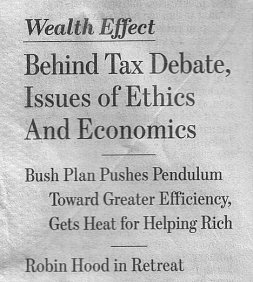Your Weekly Rush
Listening to Rush during my lunch break, and caught the tail end of a story about a jury finding against a corporation. I didn't catch any of the details of the case, but twice caught Rush using the phrase "juries made up of people too dumb to get out of Jury Duty."
Rush has had problems with the Jury System for a long time. He apparently sees it as untrustworthy. In essense he doesn't trust the American people. The only reason, in Rush's mind, that a person would serve his community by serving on a jury, is stupidity. The idea that some might see it as a patriotic duty apparently doesn't occur to him.
Perhaps he would prefer cases be decided by Judges. Often well off, they would sympathise more readily with the wealthy. Perhaps they would have little empathy with any who would bring suit against corporations, and if they did, well, a judge is a public figure, and in many cases has to run for election.
I believe in the American people. I believe in the Jury System. I believe in the Bill of Rights. But everybody's entitled to their point of view.
Listening to Rush during my lunch break, and caught the tail end of a story about a jury finding against a corporation. I didn't catch any of the details of the case, but twice caught Rush using the phrase "juries made up of people too dumb to get out of Jury Duty."
Rush has had problems with the Jury System for a long time. He apparently sees it as untrustworthy. In essense he doesn't trust the American people. The only reason, in Rush's mind, that a person would serve his community by serving on a jury, is stupidity. The idea that some might see it as a patriotic duty apparently doesn't occur to him.
Perhaps he would prefer cases be decided by Judges. Often well off, they would sympathise more readily with the wealthy. Perhaps they would have little empathy with any who would bring suit against corporations, and if they did, well, a judge is a public figure, and in many cases has to run for election.
I believe in the American people. I believe in the Jury System. I believe in the Bill of Rights. But everybody's entitled to their point of view.


